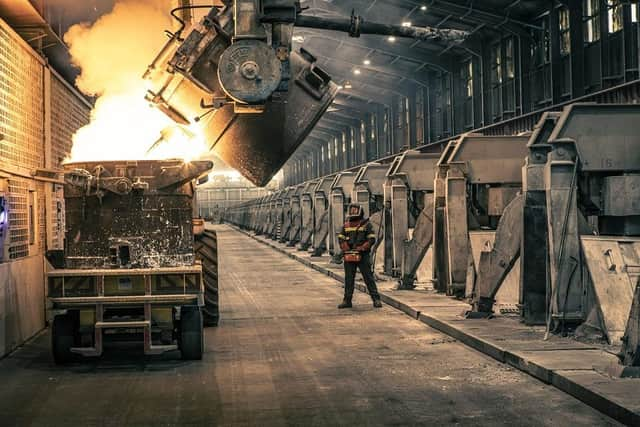Inside the controversial Lochaber smelter, as GFG Alliance chief opens up on the deal with the Scottish Government
In 2016, with Rio Tinto looking to close the aluminium smelter and associated hydro-electricity scheme, Scottish ministers and the metal magnate Sanjeev Gupta hatched a plan.
To save the smelter, and 200 jobs linked to it, the Government would guarantee 25 years of power purchases by Mr Gupta’s company – set to buy the smelter part of the business – from the hydropower plant, which would be owned by his father.
Advertisement
Hide AdAdvertisement
Hide AdThe risk of this agreement, discovered to be worth £586 million in taxpayer liability following dogged journalism by the Financial Times, would not only be offset by the jobs saved and the political benefits.


GFG Alliance would seek to build an alloy wheels plant at a cost of £70m to diversify the business and grow its market, while paying ministers a repeating multi-million pound fee as part of the guarantee agreement.
In addition, the Scottish Government gained security over the assets, including the smelter itself and the hydro-electricity plant.
It also included one of the biggest land-holdings in Scotland, cobbled together decades earlier by British Aluminium – the original owners of the smelter in 1929 – through the purchase of the Killiechonate Estate, Inverlair Estate, Inverlochy Estate and Mamore Estate from aristocratic figures.
This contract was then transformed by Greensill Capital into almost £300m of debt, carrying a credit rating the same as UK sovereign bonds, which funded the purchase of the smelter for £330m. Employees and smelter saved, the job was all but considered done.


In the years following the deal, the-then rural economy secretary Fergus Ewing would be wined and dined by Mr Gupta and Greensill Capital executives. The bond was tight, the discussion topics left off the official record, with no Government officials present.
The name Greensill Capital will be familiar due to it being in the centre of its own political lobbying controversy in Westminster involving former prime minister David Cameron and then-Cabinet minister Nadhim Zahawi.
The global finance firm’s tentacles stretched to include much of the GFG Alliance empire, and as main funders of Mr Gupta’s business, its collapse was dire news for the conglomerate.
Advertisement
Hide AdAdvertisement
Hide AdSuddenly, almost overnight, that half a billion pounds of taxpayers’ money linked to the Scottish Government looked in severe doubt. Since then, both GFG Alliance and the Scottish Government have been firefighting a growing financial and political scandal.


This global picture, however, is in stark contrast to the one on the ground in Fort William at the smelter and hydro-electricity plant.
As is always the case, those working day-in, day-out are immensely passionate about their jobs and where they work. The site has been around for almost a century under different ownership, workers span generations of Fort William locals. It is a company town.
On a dreich, sodden, freezing Monday when Scotland on Sunday visits, the smelter’s day-to-day operations continue as I am taken around by members of the team. The site is an engineering marvel, the scale of which is a monument to those who constructed it in the early 20th century.
This is particularly the case with the near-century old hydro-electricity scheme, which includes a 15-mile long tunnel, 5m in diameter, linking the Laggan and Treig dams to the plant, ultimately powering the process of creating aluminium.
These tunnels snake under Ben Nevis and through the hills of the Highlands and were built using little more than rudimentary explosives and tools. It was and remains an astonishing feat.
The surge chamber, which allows space for 45 cubic metres of water a second to rush up towards the sky when the turbines of the plant are switched off and can fill in seconds, sits on the slopes of Ben Nevis.
Within the hydro-electricity plant itself, there is an unexploded 500kg bomb that had impacted the smelter during the war displayed proudly within the hydro-electricity plant’s walls. The Germans claimed the bomb had destroyed the strategic asset, but in truth it had never been primed.
There is clearly history in this place.
But there is also controversy – political and financial.
Advertisement
Hide AdAdvertisement
Hide AdAlmost a year ago, The Scotsman reported the Scottish Government had been advised the deal with GFG Alliance may have breached state aid rules.
A source close to the initial transaction between the Government and GFG said advice around state aid in regards to the Lochaber guarantee was ignored by ministers.
At the time, the source said: “The Scottish Government were advised the guarantee was likely in breach of state aid rules, which could carry serious consequences for both the Scottish Government and GFG, and that they should proceed with absolute caution, if at all, given numerous concerns surrounding GFG and the Lochaber business plan.”
In GFG Alliance’s sunbathed London office the day after the much damper visit to Fort William, the firm’s chief transformation officer Jeffrey Kabel tells Scotland on Sunday that Scottish ministers did ignore such advice.
Despite this warning, the Government continued with the deal. It has always maintained the agreement does not breach state aid.
Asked whether he recognised the allegations, Mr Kabel said: “It was one consultant that did. It was someone Scot Gov hired."
The concern was not, however, shared by those at GFG Alliance, who were confident there was no risk. “No, not from our end,” Mr Kabel added. “We were pretty clear on that."
Unsurprisingly so, Mr Kabel is also of the belief the concerns around the deal are ultimately misplaced. Questions are understandable, he says, due to the sheer scale of the financial commitment, but when asked if he believes it is used to simply “bash the Government”, he says “in my opinion, yes.”
Advertisement
Hide AdAdvertisement
Hide Ad"I could see why there would be questions, but to blunt you ain’t got a lot of big businesses in Scotland,” he said.
"If you looked at UK in general, this is nothing, but because it was part of devolution and Scotland did this, they thought it was the best thing to do.
"I can see why it’s questioned, but I think it more of a political angle to beat the SNP with. Any other options at the time were dire, and you can always make it better. But at the time it was the best structure put in place.
"Quite honestly, I’ve seen similar in other countries. This is not rocket science.”
What about suggestions, published in the Sunday Times, that GFG Alliance paid no more than £5 for the plant?
This, Mr Kabel said, was nonsense. Pressed for a figure on how much was provided by Mr Gupta, he said: “I can’t disclose that, [but] multiple zeros. It [the story] was so bonkers."
He is defensive of the Scottish Government’s openness around the deal, stating that he does not believe there are “any smoke and mirrors” from the ministerial side.
Since the collapse of Greensill, however, the Government has appeared in panic mode. The lead minister has been the deputy of Kate Forbes and John Swinney, Ivan McKee.
Advertisement
Hide AdAdvertisement
Hide AdHe has held multiple meetings with Mr Kabel and Mr Gupta, though the regularity and concern emphasised within those meetings have declined in recent months.
Aspects of the deal, however, have caused issue. The plans for an alloy wheel factory was dropped when it became clear the market for such products was disappearing from UK soil.
That proposal has been replaced by an as-yet unbuilt billet and recycling plant, likely to cost over £100m to construct.
This, Mr Kabel says, is all but guaranteed to go ahead despite concerns from locals and politicians that it will be quietly ditched due to a lack of funding.
An engineering study is due to be completed by the end of April, with funding following close behind. "As I say to Scot Gov, unless there is a black swan moment I’m almost positive we will have everything in,” the businessman says.
"We reached agreement with our creditors in principle in November, which means the UK businesses will be debt free. We are funding part of that out of doing an asset-backed loan based off of our Australian businesses, which are doing very well.
"That should be completed in the next month or so, and that allows us to unlock some of the capital that we’ve got to put in specifically the steel businesses in the UK and to finish up the Scottish parts.”
Such a plant is, the company states, strategically valuable to the UK in the long term as minds remember the impact of the Ukraine war on production of key products. Losing the last aluminium smelter in the UK would be damaging, goes the logic.
Advertisement
Hide AdAdvertisement
Hide AdThere are also concerns the Government’s securities, what it stands to gain from GFG Alliance if the conglomerate does fold, are worth less than they believe.
A valuation of the site has been undertaken by the Scottish Government, but it has refused to publicly release it. Mr Kabel agrees with that logic. "Do they [the public] really need to understand?” he said. “No. Because all that does is raise 12 other questions, I would guess.
"It’s all political. My take on these things and I do the same thing with our much larger assets down in the south, you offer information which we’re pretty open, but sometimes it is just ‘we want more, we want more’, and delve into this and this and there’s nothing to look at, but you just end up asking a lot of questions.”
The company’s auditors, King and King, subject to a Financial Reporting Council investigation themselves, resigned last year. Again, Mr Kabel was keen to downplay the importance of such an event.
"It is difficult to get an auditor in the best of times, he said. “Even read about the big four getting fined themselves quite often, and when you’re in the situation we found ourselves, getting the accounts done let alone finding an auditor, it was impossible, we tried.
"We pretty much had tools down on the accounts. I got a whole new team that came in in September, and this is just internal people, the goal is to have all the accounts done by the end of this month.
"We literally just could not get anyone to come in and do it, and I’ve seen the list, they talked to 27 different firms. It was just purely wouldn’t because of the state of where the business was. Now it’s different, it’s a different animal.”
This saw unaudited accounts accidentally uploaded to Companies House, outlining £4m losses and “serious concern” about the future of the smelter.
Advertisement
Hide AdAdvertisement
Hide AdThe other grey cloud hanging over the Lochaber smelter is the ongoing investigation by the Serious Fraud Office [SFO] into alleged fraud and money laundering connected with operations across several of GFG Alliance’s UK businesses, including Lochaber.
Ongoing since mid-2021, multiple offices, including Fort William, were visited by SFO officers in April last year. Declining to comment on specifics, Mr Kabel admitted the investigation was “concerning”.
He said: “The whole thing is concerning. I don’t think there is anything wrong, what concerns me is that it has an impact on our people, not day to day, but it has an impact on us trying to refinance the business.
"Even when we have done some small, well considerable size financings in Australia and the US, any news comes out of here, it just affects that. We’re complying with everything we comply with, and we’ll see how it plays out. But these things sometimes are five, ten years.”
For Mr Kabel and those on the ground in Fort William, however, they view the future as bright despite the ongoing controversy.
The billet plant is the key aspect to this, and successfully constructing and finding buyers for its product will likely determine the wider business’ ongoing success – though executives claim the smelter could continue sustainably on its current model.
Helping is the business’s focus on climate and net zero, with the Jahama Estates focusing much of their efforts on peatland restoration, biodiversity, and plans for a windfarm at Glenshero – initially rejected by the Government, but set to return in a smaller form.
The hydro-electricity plant’s ability to sell to the grid following a recent upgrade to the grid connection is also key to its future, provided a source of steady income and, critically, a genuine long-term, sustainable asset.
Advertisement
Hide AdAdvertisement
Hide AdThat was also a central requirement of the Government’s £586m deal.
It would be naive to assume questions will stop about the deal even if GFG Alliance’s financial concerns continue to ease. The agreement remains a source of great political interest from opposition parties, particularly around the question of state aid.
Jamie Halcro Johnston, the Scottish Conservative spokesperson for business, said Mr Kabel’s account of the warnings around state aid meant the Government must provide a “full account” of why the deal was done.
He said: “If this account is accurate, it shows that the SNP Government was warned that this deal would breach the rules, but chose to ignore a consultant they had themselves hired. At the very least, it shows that they knew that it might be unlawful, but nonetheless put huge sums of taxpayers’ money at risk – while GFG Alliance had nothing at stake.
“This deal was grossly irresponsible as well as potentially illegal, but the SNP Government still refuses to come clean on the details. We must now have a full account of why so much public money was put at such risk, and who made these thoroughly reckless decisions.”
A Government spokesperson said: “The Scottish Government’s intervention to support the UK’s only aluminium smelter has preserved strategic industrial capacity and support the livelihoods of hundreds of people.
“Ministers received independent commercial advice in 2016 that the Lochaber Guarantee is state-aid compliant. There has been no call on the Lochaber guarantee and the Scottish Government continues to receive all the guarantee fee payments.
“GFG is committed to investing in Lochaber to secure the future of the operations, creating new high-quality employment.”
Want to hear more from The Scotsman's politics team? Check out the latest episode of our political podcast, The Steamie.
It's available wherever you get your podcasts, including Apple Podcasts and Spotify.
Comments
Want to join the conversation? Please or to comment on this article.
